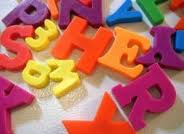Early reading – these reading games for foundation stage learners will help them master sight words and basic spelling words:
- Word Bingo: create a grid on a page and laminate it. Write your child’s sight words or spelling words on the grid with a white board marker and play bingo. She would need to read the word as you call it out and cover it up until all words are covered and she shouts Bingo!
- Passwords: for words that your child is struggling with, place them on the doors of the house and he has to read it aloud in order to gain access to the room
- Word association: Give your child one word and they have to think of as many words as they can that are linked to the word – you can play this with a number of people with everyone taking it in turns. This works nicely in the car as well. Alternatively, you can give a category and people need to list words from that category or ask that words be given beginning or ending with a specific letter that fit in the category, such as foods that begin with ‘b’.
- Snap: write out two sets of the words and you read aloud yours as you put it on the table, face up, and she has to read hers aloud and if they match, then the first to say ‘snap’ wins the pair. As she develops this skill then the reading of the words can be silent.
- Fishing: using a rod with string and a small magnet on the end, create a fishing rod. Write out the words onto card and attach one paper clip to each word, your child must ‘fish’ for the words, reading them as he catches them. If he reads it correctly he can keep the word, otherwise he has to throw it back.
- Create a series of cards with sound blends on them, such as br, st, cl, sl, gr, etc. and when your child selects a card she has to say a word that either beginning with, ends with or simply contains that letter combination.
- Play dominoes with sight words.
- Use the letters on number plates to create words.
- Using a snakes and ladders board, cover the numbers with sight words written onto cards and when you land on a square you have to read the word.
- Help your child to create or write their own story on the computer and illustrate it either by hand or with clip art pictures.
- Write out the instructions to make something that your child is interested in, a recipe, bubble bath, etc. and she must follow the written directions. If the instructions are for something she has made before then she will be able to rely on her existing knowledge to identify unfamiliar words.
- Create mnemonics and rhymes to help your child remember the spelling of irregular words, such as ‘friend’ – I fried my friend and that’s the end.
- From the beginning of the year, create a list of all your child’s sight words and write them on small pieces of paper, placing them all in a jar or tin. Everyday your child can shake the jar and pick out 10 (or more) words to read.
- Play Scrabble to assist with spelling or simple use the tiles to identify the alphabet, or to practice spelling difficult words with three dimensional tiles, giving an additional dimension to learning.
- Use word searches, either commercially bought or created at home to help your child identify words he is finding difficult.
- When your child learns a new syllable or sound blend, encourage them to rewrite the words using a different colour for each sound to create visual interest as they read
Related articles:


